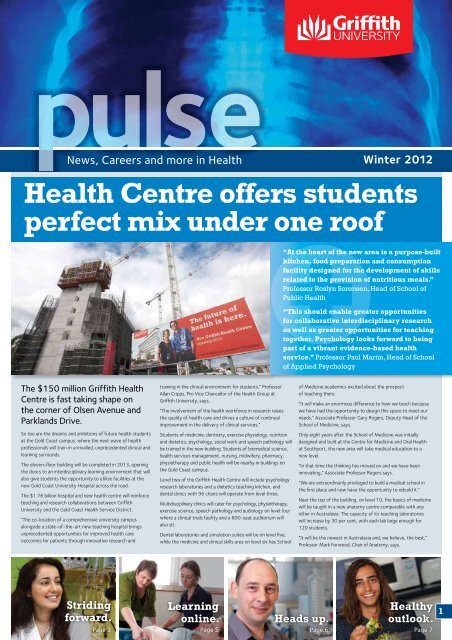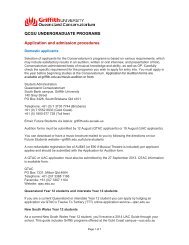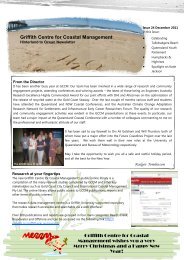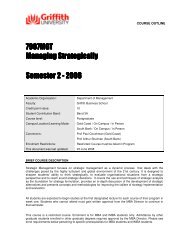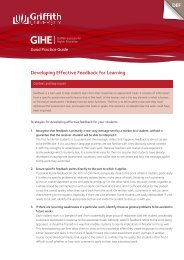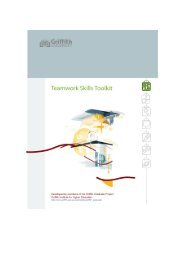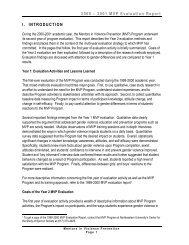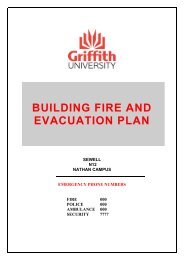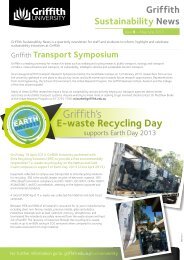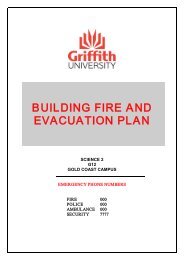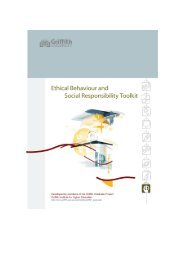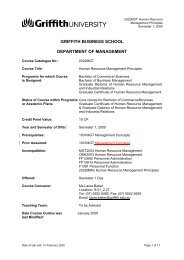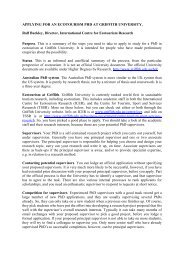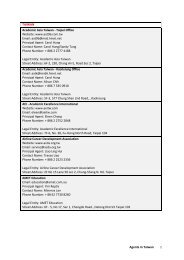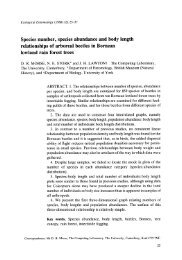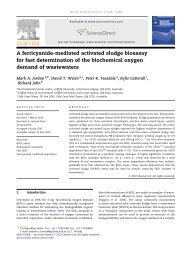Pulse Issue 6 Winter 2012 ( PDF 1100k) - Griffith University
Pulse Issue 6 Winter 2012 ( PDF 1100k) - Griffith University
Pulse Issue 6 Winter 2012 ( PDF 1100k) - Griffith University
You also want an ePaper? Increase the reach of your titles
YUMPU automatically turns print PDFs into web optimized ePapers that Google loves.
pulse<br />
News, Careers and more in Health <strong>Winter</strong> <strong>2012</strong><br />
Health Centre offers students<br />
perfect mix under one roof<br />
“At the heart of the new area is a purpose-built<br />
kitchen, food preparation and consumption<br />
facility designed for the development of skills<br />
related to the provision of nutritious meals.”<br />
Professor Roslyn Sorensen, Head of School of<br />
Public Health<br />
“This should enable greater opportunities<br />
for collaborative interdisciplinary research<br />
as well as greater opportunities for teaching<br />
together. Psychology looks forward to being<br />
part of a vibrant evidence-based health<br />
service.” Professor Paul Martin, Head of School<br />
of Applied Psychology<br />
The $150 million <strong>Griffith</strong> Health<br />
Centre is fast taking shape on<br />
the corner of Olsen Avenue and<br />
Parklands Drive.<br />
So too are the dreams and ambitions of future health students<br />
at the Gold Coast campus, where the next wave of health<br />
professionals will train in unrivalled, unprecedented clinical and<br />
learning surrounds.<br />
The eleven-floor building will be completed in 2013, opening<br />
the doors to an interdisciplinary learning environment that will<br />
also give students the opportunity to utilise facilities at the<br />
new Gold Coast <strong>University</strong> Hospital across the road.<br />
The $1.76 billion hospital and new health centre will reinforce<br />
teaching and research collaborations between <strong>Griffith</strong><br />
<strong>University</strong> and the Gold Coast Health Service District.<br />
“The co-location of a comprehensive university campus<br />
alongside a state-of-the-art new teaching hospital brings<br />
unprecedented opportunities for improved health care<br />
outcomes for patients through innovative research and<br />
training in the clinical environment for students,” Professor<br />
Allan Cripps, Pro Vice Chancellor of the Health Group at<br />
<strong>Griffith</strong> <strong>University</strong>, says.<br />
“The involvement of the health workforce in research raises<br />
the quality of health care and drives a culture of continual<br />
improvement in the delivery of clinical services.”<br />
Students of medicine, dentistry, exercise physiology, nutrition<br />
and dietetics, psychology, social work and speech pathology will<br />
be trained in the new building. Students of biomedical science,<br />
health services management, nursing, midwifery, pharmacy,<br />
physiotherapy and public health will be nearby in buildings on<br />
the Gold Coast campus.<br />
Level two of the <strong>Griffith</strong> Health Centre will include psychology<br />
research laboratories and a dietetics teaching kitchen, and<br />
dental clinics with 96 chairs will operate from level three.<br />
Multidisciplinary clinics will cater for psychology, physiotherapy,<br />
exercise science, speech pathology and audiology on level four<br />
where a clinical trials facility and a 600-seat auditorium will<br />
also sit.<br />
Dental laboratories and simulation suites will be on level five,<br />
while the medicine and clinical skills area on level six has School<br />
of Medicine academics excited about the prospect<br />
of teaching there.<br />
“It will make an enormous difference to how we teach because<br />
we have had the opportunity to design this space to meet our<br />
needs,” Associate Professor Gary Rogers, Deputy Head of the<br />
School of Medicine, says.<br />
Only eight years after the School of Medicine was initially<br />
designed and built at the Centre for Medicine and Oral Health<br />
at Southport, the new area will take medical education to a<br />
new level.<br />
“In that time the thinking has moved on and we have been<br />
innovating,” Associate Professor Rogers says.<br />
“We are extraordinarily privileged to build a medical school in<br />
the first place and now have the opportunity to rebuild it.”<br />
Near the top of the building, on level 10, the basics of medicine<br />
will be taught in a new anatomy centre comparable with any<br />
other in Australasia. The capacity of its teaching laboratories<br />
will increase by 30 per cent, with each lab large enough for<br />
120 students.<br />
“It will be the newest in Australasia and, we believe, the best,”<br />
Professor Mark Forwood, Chair of Anatomy, says.<br />
Striding<br />
forward.<br />
Page 3<br />
Learning<br />
online.<br />
Heads up.<br />
Healthy<br />
outlook.<br />
Page 5 Page 6 Page 7<br />
1
Environment comes<br />
calling<br />
Environmental health<br />
Opportunity is knocking for future graduates.<br />
Dr Ross Sadler at <strong>Griffith</strong> <strong>University</strong>’s School of<br />
Public Health identifies a wide and ever-extending<br />
mix of career paths for environmental health officers<br />
to pursue.<br />
“In Queensland they are needed everywhere,”<br />
Dr Sadler says. “But there is also great scope for<br />
employment overseas.”<br />
Changes to state government policy have created<br />
new openings at local authority level, while airlines,<br />
cruise ships and traditional large institutions now<br />
have an unprecedented environmental health focus.<br />
“Environmental health officers are also needed more<br />
and more in the wake of natural disasters, after<br />
extreme weather events, and to deal with the fallout<br />
from chemical accidents.<br />
“Emerging areas like the science of climate change,<br />
e-waste and the natural resources sector all have an<br />
environmental health presence.”<br />
From the start of 2013 <strong>Griffith</strong> <strong>University</strong> will offer<br />
a stand-alone Bachelor of Environmental Health * at<br />
its Gold Coast campus, responding to an emerging<br />
market need.<br />
* Subject to final <strong>University</strong> approval. Accreditation for <strong>Griffith</strong>’s<br />
Environmental Health degree is being sought with Environmental<br />
Health Australia.<br />
Sally Swanson is a third-year student of Public<br />
Health at <strong>Griffith</strong> <strong>University</strong>, who hopes to work as<br />
an environmental health officer in local government<br />
on the Gold Coast.<br />
“The population of the Gold Coast is continually<br />
expanding, and environmental health factors are<br />
keeping pace,” she says.<br />
Along with a vigorous analysis of workplace health<br />
and safety, infection control, and food and drug<br />
safety, students will also study the legislation<br />
underlining environmental health. There will also be<br />
a dedicated focus on the latest scientific knowledge<br />
informing the area.<br />
“A good environmental health officer should only use<br />
legislation as a last resort,” Dr Sadler says.<br />
“In most cases they are able to work with a noncompliant<br />
industry to get them where they need to<br />
be in terms of environmental health standards.<br />
“At <strong>Griffith</strong> <strong>University</strong> we place considerable<br />
emphasis on developing judgment and interpersonal<br />
skills so our graduates are well equipped to solve<br />
problems by professional interaction with industry<br />
and the community.”<br />
CLEARING THE AIR. Dr Ross Sadler discusses air quality with<br />
environmental health students.<br />
Gaining the skills to reshape lives<br />
Applied Psychology<br />
CURIOUS MIND. Govind Krishnamoorthy has always<br />
been intrigued by what makes people tick.<br />
As a psychologist Govind<br />
Krishnamoorthy talks about<br />
the light bulb moment,<br />
that millisecond when his<br />
professional endeavours<br />
connect with a client.<br />
“I love the challenge of getting people to be receptive,<br />
to realise that what they think they want is perhaps not<br />
necessarily what they need in their lives at this point,”<br />
he says.<br />
“I’ve always been into figuring out why people<br />
do what they do. It’s a kind of curiosity.”<br />
He says he had an an abstract outlook on life from an<br />
early age that set him apart from his peers.<br />
“My dad used to encourage me to question everything,<br />
including traditions and authority.”<br />
These early thoughts and attitudes crystallised into<br />
career ambitions for Govind. A real career pathway took<br />
shape while he gained a degree in Behavioural Science,<br />
an honours degree in Psychology and a PhD in Clinical<br />
Psychology from 2003 to 2011 at <strong>Griffith</strong> <strong>University</strong>.<br />
“When I was reading for exams I found it all<br />
very interesting, very different, very exciting.<br />
“Doing the coursework made me reflect on my own<br />
personal struggles and I realised if people were more<br />
attentive to their internal lives — their thoughts,<br />
emotions and desires — they could shape their lives to<br />
be a lot more satisfying.<br />
“Change is often difficult. It’s important to listen<br />
carefully to people’s experiences and skillfully<br />
communicate what we (psychologists) know about<br />
human behaviour. I see this as a process of guiding them<br />
to create a life that best fits their needs.”<br />
Near the time of his graduation Govind was appointed<br />
as a professional development coordinator at a Mater<br />
Hospital Community Outpatient Clinic in Brisbane.<br />
He works mainly with children, their carers and other<br />
relevant stakeholders in issues of mental health linked to<br />
foster care.<br />
“I had a placement at the Mater’s Child and Youth Mental<br />
Health service in 2008. I learned a lot there and the<br />
support and supervision was great. My work continues<br />
to challenge me, pushing me to develop greater insights<br />
into the human condition.”<br />
2<br />
griffith.edu.au/health
Nursing degree leads to<br />
doctor’s future<br />
MEDICINE<br />
When 25-year-old School of Medicine graduate Dale<br />
Currey started life as an intern at Logan Hospital, she held<br />
an advantage over most of her peers.<br />
Dale, from Brisbane, had previously worked at the<br />
hospital as an emergency nurse after graduating as<br />
a nurse in 2006.<br />
Her nursing degree would ultimately pave the<br />
way for her to study medicine through <strong>Griffith</strong><br />
<strong>University</strong>’s Bachelor of Medicine/Bachelor of<br />
Surgery program from 2008 to 2011.<br />
“I think nursing has been an excellent stepping stone<br />
to becoming a doctor,” she says.<br />
“It has given me a great advantage throughout my<br />
clinical training years and also when I started my<br />
career as an intern.<br />
“You get to know how a hospital works and learn<br />
many of the skills that, like nurses, doctors also<br />
require. Most importantly, you learn how to talk<br />
to, and interact with, patients.<br />
“As a nurse I was able to work part-time and earn<br />
a professional-level wage, enabling me to practise<br />
important skills relevant to both nursing and<br />
medicine while studying to be a doctor.”<br />
Dale also bolstered her studies by completing a<br />
research article as part of a <strong>Griffith</strong> <strong>University</strong><br />
Primary Health Care writing bursary scholarship.<br />
The research investigated different neonatal<br />
outcomes resulting from caesarean sections<br />
compared with natural births.<br />
“I always want to know more,” says Dale, who<br />
started her internship on the obstetrics and<br />
gynaecology ward.<br />
She also received a Queensland Health bonded<br />
medical scholarship to support her education at<br />
<strong>Griffith</strong> <strong>University</strong> and is excited that, as a result,<br />
she will be working within Queensland Health<br />
for six years, as she lays the foundations for a<br />
medical career.<br />
RIGHT MEDICINE. Becoming a doctor has been an informed<br />
and hands-on experience for medicine graduate Dale Currey.<br />
Life in the fast lane<br />
MEDICAL SCIENCE<br />
Victoria Ozberk was only 19 when she graduated with an<br />
honours degree in biomedical science.<br />
She is now researching a doctoral thesis into ageing<br />
hearts, which she aims to complete within three years.<br />
After that she plans to do medicine and train to be<br />
a doctor.<br />
came a point where I knew I had it under control.”<br />
A limited number of high schools make the<br />
accelerated pathway available to students through<br />
partnerships with <strong>Griffith</strong> Health.<br />
PERFECT PATHWAY. Dedication and determination guided<br />
PhD candidate Victoria Ozberk to her honours degree.<br />
“I recommend it,” Victoria says of her<br />
demanding schedule.<br />
“It has ended up working out for me and was<br />
definitely worth it. It all led me on to a great<br />
career path.”<br />
A keen focus and gritty attitude accelerated<br />
Victoria from her last two years of high school at<br />
the Queensland Academy of Health Sciences straight<br />
into second year of a biomedical science degree at<br />
<strong>Griffith</strong> <strong>University</strong>’s Gold Coast campus.<br />
“I found the first semester very challenging. It<br />
required a certain type of determination,” she says.<br />
“I had to find things out faster, learn techniques<br />
while also keeping up with the theory. But I had great<br />
support from classmates and mentors and there<br />
Victoria was one of 15 high school students selected<br />
for the program and had to devote hours of extra<br />
study to intensive courses in biophysics, anatomy and<br />
physiology as part of a health study certificate.<br />
She now reflects on this effort with pride, delighted<br />
by the prospect of completing a PhD in her early 20s.<br />
“When things work and go to plan in the lab it’s<br />
quite exciting. You know you’re contributing to<br />
something big.<br />
“Without that research how would we have medicine,<br />
how would we have prescriptions? It is the kind of<br />
new knowledge that has to be discovered before it<br />
can be applied to a medical situation.”<br />
griffith.edu.au/health<br />
3
“…We have the power<br />
to engage in areas where<br />
people have given up...”<br />
HEALTHY INSIGHT<br />
WITH PROFESSOR PATRICK O’LEARY,<br />
HEAD OF SCHOOL OF HUMAN SERVICES<br />
AND SOCIAL WORK<br />
When I was a student … I worked very hard to pass and<br />
when I worked out that working very hard got you a better<br />
result than a pass it really motivated me. <strong>University</strong> opened<br />
up a whole lot of possibilities that hadn’t been on my radar<br />
and today at <strong>Griffith</strong> <strong>University</strong> we focus on possibilities<br />
and participation for all students.<br />
Social work first captured my attention when …<br />
I worked out that what actually drives people’s minds is<br />
our social environment, our upbringing, what we’ve come<br />
to believe, what we take for granted. That’s really what<br />
got me into social work, the chance to challenge that<br />
social environment. You get to see people’s lives at both<br />
their pinnacles and low points, and both are a privilege<br />
for social workers because we really see what people are<br />
made of, their strength, their capacity. We have the power<br />
to engage in areas where a lot of people have given up.<br />
We try and find hope from seemingly hopeless situations.<br />
The best academics … impart hope and challenge<br />
thinking. Social work is about capturing people’s<br />
imaginations and creating hope for change. That’s what<br />
drives a really good academic because that energy is what<br />
can drive students into the profession. I was very fortunate<br />
when I was a student. I had several social work academics<br />
who were able to challenge thinking and incorporate a<br />
sense of hope that you really can make a difference. But<br />
you need to be able to justify that with a professional<br />
methodology. Good intentions are not enough on their own.<br />
Practical placements are the best way to … join the<br />
dots. Social work and human services are applied professions<br />
that grew from social sciences and health, not only with<br />
a theoretical orientation but with an applied orientation.<br />
So placements are critical. That first time seeing a client<br />
is a very formative time for a social work or human services<br />
student because it’s one of the first times you get to<br />
develop your professional identity. That’s where students<br />
can join the dots and articulate what is their purpose.<br />
Students will leave a good lecture … with some<br />
sense of imagination of what is possible and what<br />
further questions need to be asked. If they leave with a<br />
sense of hope that something is possible and accessible,<br />
then that’s a good lecture. But it’s also important they<br />
have a sense of how they can make a difference.<br />
The best skills for a career in human<br />
services are … communicating and relationship<br />
skills. Our tool set is ourselves. It’s primarily about<br />
communication and the relationships we can build<br />
with individuals, families and communities. You’ve<br />
got to enjoy being with people and value them.<br />
Our graduates find work … in a seemingly endless<br />
number of areas. Traditionally, graduates went into health,<br />
family and community services, which is still very relevant.<br />
But it’s important to see the possibilities of going beyond<br />
the stereotypical idea of human services and social work.<br />
My work has taken me into a whole range of areas around<br />
the world. I’ve worked in mental health, homelessness, child<br />
protection, counselling and international aid work. The great<br />
thing about human services and social work is the portability.<br />
If I was a student today … I would try and capture some<br />
time to think. I think life is busier for students today and the<br />
demands on students are higher. There’s lots to think about<br />
when you’re at university and it’s important to enjoy that<br />
journey. Students can get caught up in rushing from parttime<br />
jobs to lectures to online exercises to social events and<br />
not get time to look back and smell the roses, so to speak.<br />
As Head of School my motto is … to ensure the best<br />
opportunities are available for students and staff to<br />
develop themselves at a professional and personal level.<br />
THE BACHELOR OF HUMAN SERVICES WILL BE AVAILABLE AT<br />
THE GOLD COAST CAMPUS OF GRIFFITH UNIVERSITY FROM 2013<br />
Revelling in the range of opportunities<br />
Human Services and Social Work<br />
A lifelong ambition was realised for<br />
Tammie Usher when she travelled<br />
to Bangalore as part of a <strong>Griffith</strong><br />
<strong>University</strong> study trip involving<br />
human services and social work<br />
students.<br />
The Gateway to India project focused on social justice<br />
and community development in some of the city’s<br />
poorest areas.<br />
Tammie says she was struck by the lack of government<br />
support for NGOs in India compared to Australia, and<br />
also how women were largely undermined in the maledominated<br />
culture.<br />
“Here, we turn on a tap and get clean water. They turn<br />
on a tap and get diarrhoea.<br />
“I think we still have social problems here that are<br />
covered up and the study tour highlighted some<br />
strategies that could be implemented here.”<br />
The mum of two is in her second year of a human<br />
services degree at <strong>Griffith</strong> <strong>University</strong>’s Logan campus.<br />
“I’ve come to university wanting a better life for<br />
me and my family. I’ve always had that passion for<br />
a better life, but now I want a career, not just a job.<br />
I know I’m on the right track.<br />
“Everybody has a right to be somebody. Everybody has<br />
a right to go somewhere in life.<br />
“There are about 80 different jobs I could have.<br />
The mind boggles.”<br />
4<br />
The memory of the deformed face of a young woman<br />
who begged her for five rupees has also stayed with<br />
Tammie on her return.<br />
“I don’t think I was prepared for it. Preparing to go<br />
there I thought ‘Great, we get to go and help children’.<br />
griffith.edu.au/health<br />
Tammie finished high school without an OP but that<br />
did not deter her ambition.<br />
“I believe anyone can do anything,” she says.<br />
After 10 years’ working in childcare and two years as<br />
a teacher aid, she knew which direction she wanted to<br />
take her career and she knew her time had come.<br />
CAN-DO ATTITUDE. Tammie Usher has embraced the exciting<br />
opportunities that have come her way at <strong>Griffith</strong> <strong>University</strong>.
Online option opens<br />
door to degree<br />
Midwifery<br />
When the midwife for the birth of her second baby alerted her to<br />
the online possibilities of <strong>Griffith</strong> <strong>University</strong>’s Bachelor of Midwifery<br />
program, Jodie Turner’s career ambitions had a new lease of life.<br />
“I wouldn’t have been able to take on university without this<br />
online opportunity,” the Toowoomba mother says. “I couldn’t<br />
commit to time and lectures at university.”<br />
Jodie contacted the School of Nursing and Midwifery to<br />
discuss how achievable a three-year full-time university<br />
program would be for a mum with two children under the<br />
age of three.<br />
After a little hesitation, she took a leap of faith.<br />
“It’s definitely busier than the average course but it’s a lot<br />
more flexible. I can do the modules in my time. I don’t have<br />
to be anywhere at any specific time. For me, after I put the<br />
children to bed, 7pm-11pm is my prime time for learning<br />
and study each night.”<br />
With a little give-and-take in husband Seain’s schedule,<br />
Jodie also organised her week so that practical placements<br />
and clinical skills training at Toowoomba Base Hospital and<br />
local birthing centres were easily arranged.<br />
“I love it. It suits me very well. I like to work at my own pace.<br />
I’ve always worked well setting myself goals.”<br />
Among the key interactive elements of her education are<br />
the online lectures where she can get involved and ask a<br />
question by simply putting a virtual hand in the air. The<br />
option to review archived lectures also gives her further<br />
room for manoeuvre.<br />
“We have a lively Facebook page which helps students get<br />
to know each other better. I feel, even though we live in<br />
different towns, that I know people better than I would if I<br />
was physically studying at university.”<br />
Students based in Townsville and northern NSW are also<br />
taking advantage of the online teaching facility.<br />
Jodie aims to work in a continuity of care role, supporting<br />
women through pregnancy and childbirth, in the future and<br />
eventually be eligible to work in private practice.<br />
“I would love to see society embrace birth as a positive and<br />
empowering experience.”<br />
BALANCED APPROACH. Mother-of-two Jodie Turner has used<br />
online learning to blend parenthood with student life.<br />
Laos experience boosts<br />
overseas nursing plan<br />
Nursing<br />
The idea of aid work and helping people in some of<br />
the world’s poorest countries has always appealed<br />
to Kimberley Cook.<br />
WORLDLY WISE. Nursing student Kimberley Cook<br />
has found inspiration from a placement in Laos.<br />
Now the third-year nursing student from<br />
Brisbane is only a step or two from making this<br />
ambition a reality, with Africa very much in<br />
her sights.<br />
Her plan is to gain valuable hospital experience<br />
after she graduates from <strong>Griffith</strong> <strong>University</strong>’s<br />
School of Nursing and Midwifery in <strong>2012</strong>,<br />
before packing her bags and turning her<br />
attentions to the wider world.<br />
An influential part of her African preparation<br />
is already safely in the bag in the form of an<br />
international clinical placement in Laos.<br />
Kimberley was among 34 <strong>Griffith</strong> <strong>University</strong><br />
nursing students who provided healthcare<br />
services to rural Laos as part of a three-week<br />
placement in January <strong>2012</strong>.<br />
“Before Laos I didn’t know if I could handle<br />
such challenging situations. That’s one of<br />
many reasons why Laos was so important to<br />
me. I realised I could handle difficult situations<br />
and not let my emotions be led by the terror<br />
people are exposed to and the terrible lack of<br />
resources,” she says.<br />
“Our skills were tested and we were constantly<br />
challenged to come up with ideas and solutions<br />
for the problems we faced. It was so exciting<br />
to be making important decisions with our<br />
teachers and the health workers in Laos.”<br />
After spells working in hospitality and debt<br />
collecting, Kimberley found a more progressive<br />
career pathway in nursing.<br />
“I was sick of jobs that you only get so far with.<br />
Nursing is a perfect base to do so many things<br />
at home and overseas. The opportunities<br />
seemed endless when I started looking into it,”<br />
she says.<br />
“I love people, I love talking to people, listening<br />
to people, I love helping people, learning about<br />
other people’s lives and hearing their stories.<br />
“Nursing allows me to do that. To begin with,<br />
it is a solid career choice.”<br />
griffith.edu.au/health<br />
5
6<br />
“Critical thinking and<br />
problem solving are<br />
generic skills essential<br />
to a pharmacy career”<br />
HEALTHY INSIGHT<br />
WITH PROFESSOR ANDREW DAVEY,<br />
HEAD OF SCHOOL OF PHARMACY<br />
When I was a student I<br />
wanted to … get the most<br />
out of my time at university.<br />
I had a work hard-play hard<br />
philosophy. I made sure that<br />
I did enough to get the grades<br />
that I needed, which by the<br />
end of the degree included<br />
high-enough grades to enter<br />
into a PhD. At the same time I<br />
played for the college and the<br />
university rugby teams and<br />
was an active member of a<br />
very vibrant pharmacy student association. This was a big period<br />
of personal growth.<br />
Pharmacy first captured my attention when … I was<br />
considering my options for university. I was interested in science<br />
but looking for a degree with a defined career. Pharmacy offered<br />
a very broad science degree that appealed to my interests and I<br />
knew that there was a job at the end of the degree.<br />
The best academics are a mix of … passion, enthusiasm and<br />
vision, tempered with emotional intelligence and the ability to<br />
think strategically. Excellent communication skills are paramount.<br />
Practical placements are the best way to … relate knowledge<br />
and skills gained in the classroom to what happens in the<br />
workplace on a day-to-day basis. They also present an excellent<br />
opportunity to impress a potential future employer.<br />
Students will leave a good lecture … enthusiastic about what<br />
they have learnt and wanting to follow up and learn more about<br />
the topic.<br />
The best skills for a career in pharmacy are … dependent<br />
on which career path a graduate chooses to undertake.<br />
The career options are many and varied and each will have<br />
a different emphasis on a particular skill. A solid foundation<br />
in the pharmaceutical sciences is essential for all these roles.<br />
Strong communication skills are usually close to the top of<br />
any employer’s requirements. I would add critical thinking and<br />
problem solving as generic skills that are essential for<br />
all pharmacy career pathways.<br />
Our graduates find work … mostly in community or hospital<br />
pharmacy, including medication management or extended<br />
pharmacy roles within the community. However there is an<br />
increasing interest in developing careers in one of the many roles<br />
offered by the pharmaceutical industry including drug discovery<br />
and development, clinical trials, regulatory affairs, sales and<br />
marketing, drug information, quality control or manufacturing.<br />
We also have a good number of graduates undertaking higher<br />
research degrees with a view to an academic career.<br />
If I was a student today … I would try to have a similar<br />
philosophy as I had when I was a student. However the<br />
environment in which students work has changed in many ways.<br />
Twenty-plus years ago there wasn’t much direction or support<br />
for students and we were essentially left to work things out<br />
for ourselves. This accelerated our independence as we tried to<br />
work out the right balance between time in the bar and time for<br />
study. <strong>University</strong> life has changed significantly since then and<br />
there is now a lot more support and information available to<br />
students at all levels of the university. However, I believe that this<br />
increase in support is counterbalanced by increased pressure on<br />
current students compared to the past. Most are working parttime,<br />
many have significant family responsibilities, the subject<br />
knowledge base is rapidly expanding and competition for the<br />
best jobs is increasing. So as a student today I would ensure that<br />
I took advantage of as much as possible of what the university<br />
has to offer, including academic studies and support, social/<br />
sporting/cultural activities and personal development training.<br />
It is important to do this without burning out given the other<br />
pressures faced by students, so good breaks and rest are<br />
also essential.<br />
As Head of School my motto is … to ensure that students<br />
and staff in the School have the opportunity to reach their full<br />
potential.<br />
griffith.edu.au/health<br />
Jessica can’t shake<br />
pharmacy bug<br />
Pharmacy<br />
Starting work as a 19-year-old pharmacy<br />
assistant set Tasmanian Jessica Bugg on the<br />
road to <strong>Griffith</strong> <strong>University</strong>.<br />
During this time she developed an interest and passion for<br />
the pharmaceutical world.<br />
“I loved learning about the medications and I loved the<br />
enduring relationships that we developed and nurtured with<br />
clients through the years,” Jessica says.<br />
“I just enjoyed helping people and learning about healthcare<br />
at the same time.”<br />
When she moved to Queensland in 2005 it was natural that<br />
she should take up a job working as a dispensary technician<br />
at a Gold Coast pharmacy.<br />
She entered and won through to the finals of the<br />
Queensland Pharmacy Assistant of the Year.<br />
“I had completed all the education I could up to that point,<br />
short of going to university, and I wanted a new challenge,”<br />
she says.<br />
She eventually applied to do a Bachelor of Pharmaceutical<br />
Science and, after completing bridging courses in chemistry<br />
and maths, she started university full-time in 2009,<br />
aged 29.<br />
Along with previous TAFE certificates and extensive<br />
experience in the industry, she was very well equipped for<br />
the challenge.<br />
“I got a traineeship in my home town and I haven’t looked<br />
back. It’s definitely pharmacy for me all the way. It’s in my<br />
blood, I guess.<br />
“I had the experience, I knew what it was like to work there<br />
so I knew this is what I wanted to study.”<br />
Jessica graduated with a degree in pharmaceutical science<br />
in December 2011, helped along with a scholarship from<br />
Pharmacy Cricket, an inititative of pharmacists of Australia,<br />
and is now studying a Master of Pharmacy.<br />
“I’m not sure exactly where I will end up but I’m looking<br />
forward to being able to use my new skills, to embracing<br />
the future of pharmacy and the expanding role of<br />
the pharmacist.”<br />
Getting to the art<br />
of dental detail<br />
Dentistry and Oral Health<br />
As a child Terrie Sichter always looked<br />
forward to visiting her Townsville dentist and<br />
soon settled on dentistry as a realistic and<br />
attractive career option for her.<br />
“I just loved it. I loved the smell. I loved the whole<br />
experience,” she says.<br />
As a child Terrie also loved art.<br />
Throughout her primary school days her flair for art was<br />
nurtured and encouraged, and by the time she had moved<br />
on to high school Terrie was determined not to let the big,<br />
bad world swallow up her artistic streak.<br />
“I wanted to do something with it. I didn’t want to waste it<br />
in a boring job,” she says.<br />
When she discovered the Bachelor of Oral Health in Dental<br />
Technology in a <strong>Griffith</strong> <strong>University</strong> program guide, her<br />
hopes and dreams seemed to come together.<br />
“It’s the artistic side of dentistry. You get to make things<br />
with your hands, you get to go into a lab and do practical,<br />
hands-on work.”<br />
She is excited about the creative range of opportunities<br />
at her dental technology fingertips, from orthodontics<br />
to dentures.<br />
“There are so many areas to choose from, so many areas<br />
where I could specialise. And I like so many of them.”<br />
RIGHT MOVE. Industry experience meant Jessica Bugg<br />
knew she was on the right track when she decided to<br />
study pharmaceutical science at <strong>Griffith</strong> <strong>University</strong>.<br />
HELPING HAND. Dr Jane Evans (right) has nurtured<br />
Terrie Sichter’s avid interest in dental prosthetics.<br />
She is drawn, predominantly, to the world of dental<br />
prosthetics. The creative and transformative process of<br />
waxing, pouring and designing implants appeals to her<br />
artistic side.<br />
“With the wax you can carve it out and put as much detail<br />
as you like into it.”<br />
The third-year student plans to build on her degree in<br />
Oral Health in Dental Technology, and study a Master<br />
of Dental Technology in Prosthetics at the new <strong>Griffith</strong><br />
Health Centre.
Appetite for education<br />
enhanced by exchange<br />
Nutrition and Dietetics<br />
As a talented young triathlete Jamie<br />
Mollica recalls a seminar hosted by<br />
the Queensland Academy of Sport<br />
and a lecture on the importance<br />
of healthy eating for highperformance<br />
athletes.<br />
The Gold Coast teenager was influenced at the time by the<br />
very latest information and knowledge on nutrition. He was<br />
also inspired significantly in another way by the lecture.<br />
“I thought to myself I could do that,” the 21-year-old says.<br />
Now in his third year at <strong>Griffith</strong> <strong>University</strong>, the Nutrition and<br />
Dietetics student is on course to achieve that ambition, and<br />
even build on it.<br />
“I did public health in first year because I wanted to get a<br />
feel for its broader range of possibilities. There are so many<br />
options,” he says.<br />
“I had been leaning towards nutrition because I already<br />
had an interest in staying healthy and living healthy<br />
through sport.<br />
“If I could combine this with helping people in the healthcare<br />
industry, then all the better.”<br />
He says his interest in the subject has been further<br />
invigorated by the anatomy and physiology part of the<br />
program which has revealed a “a whole new world”.<br />
The link between obesity and diabetes and cardiovascular<br />
disease has also been an eye-opener, so too the prevalence<br />
of anorexia, which he describes as an overlooked side of<br />
nutrition and dietetics .<br />
FOOD FOR THOUGHT. Jamie Mollica’s interest in healthy<br />
diets has been taken to a new level at <strong>Griffith</strong> <strong>University</strong>.<br />
A <strong>Griffith</strong> <strong>University</strong> exchange program has opened the door<br />
for Jamie to take his study overseas. He is spending three<br />
months (April – July <strong>2012</strong>) in the United States studying<br />
nutrition at California State <strong>University</strong> Los Angeles.<br />
“The idea of going to live and learn on campus in California is<br />
so exciting.”<br />
A helping hand through<br />
early days of uni life<br />
<strong>Griffith</strong> Honours College<br />
KNOWING MORE. Sean Certeza took his interest in exercise<br />
physiology into the field and found out what he needed to know.<br />
Sneak preview points<br />
Sean in right direction<br />
Physiotherapy and Exercise Science<br />
All Sean Certeza needed was<br />
a week in the life of another<br />
graduate of exercise science to<br />
know where his career was heading.<br />
His friend Adam Lyons, a qualified exercise<br />
physiologist, had invited Sean to shadow<br />
him for a week as he attended aged care<br />
facilities across the Gold Coast.<br />
Sean watched Adam, who graduated from<br />
<strong>Griffith</strong> <strong>University</strong> with a degree in exercise<br />
science in 2009, as he helped people get<br />
their lives on track after health setbacks.<br />
“You really have to think on your feet,” Sean<br />
says. “It’s important to be able to develop<br />
a rapport with people and to understand<br />
their psychological needs.”<br />
Adam had clocked up the 500 hours<br />
required for accreditation by Exercise and<br />
Sport Science Australia during his time in<br />
the workforce after graduation. He is now<br />
an accredited exercise physiologist.<br />
For Sean, who graduated with a Bachelor<br />
of Exercise Science in 2011, another<br />
option presented itself in the form of<br />
<strong>Griffith</strong> <strong>University</strong>’s Graduate Diploma<br />
of Exercise Science.<br />
The one-year postgraduate program<br />
combines advanced exercise science<br />
coursework with key clinical placements,<br />
allowing students to build up the hours<br />
required while developing the skills to work<br />
in a range of clinical settings.<br />
This has been the ideal springboard for<br />
Sean to consider emerging employment<br />
opportunities. He is enthusiastic about<br />
the future and the prospect of prescribing<br />
exercise as treatment.<br />
“A lot of people aren’t aware of how<br />
exercise helps in the management and<br />
prevention of chronic diseases like prostate<br />
cancer, diabetes, heart disease, and its role<br />
in tackling the obesity epidemic. A proper<br />
exercise routine can prevent the onset of<br />
diabetes as well as associated conditions<br />
such as heart failure or hypertension,”<br />
he says.<br />
“I will be able to advise people on setting<br />
goals for weight loss and support people<br />
recovering from a stroke. Helping people<br />
return to work after illness is a major part<br />
of the role of the exercise physiologist.”<br />
In her own words Yasuchiyo Hamilton was “a bit<br />
torn” about her dream career while a high school<br />
student on the Gold Coast.<br />
She was attracted to veterinary science but<br />
had more than a hankering for medicine.<br />
In the end she opted for the latter and has not<br />
regretted that decision for a moment.<br />
“I’m loving it,” says the second-year student<br />
of medical science at <strong>Griffith</strong> <strong>University</strong>’s<br />
Gold Coast campus.<br />
On completion of second year, the 19-yearold<br />
will gain automatic entrance to the<br />
Bachelor of Medicine/Bachelor of Surgery<br />
program at <strong>Griffith</strong> <strong>University</strong> (subject to<br />
entry requirements).<br />
“Everything is so interesting and relevant.”<br />
She makes no secret of the culture shock she<br />
first experienced when taking the leap from<br />
high school to university life, but has been<br />
motivated and guided by the people around<br />
her at <strong>Griffith</strong> <strong>University</strong>.<br />
She is vocal in her appreciation of the<br />
support that came her way from the <strong>Griffith</strong><br />
Honours College.<br />
“The security and reassurance they provide<br />
you is something you wouldn’t normally<br />
get somewhere else. When I spoke with<br />
Jeanne (McConachie) she just put things in<br />
perspective, broke it all down for me.”<br />
Jeanne McConachie is Manager of the<br />
<strong>Griffith</strong> Honours College, which is designed<br />
to enrich the experiences of outstanding<br />
university students in combination with their<br />
undergraduate studies.<br />
WHAT AN HONOUR. Biomedical science student Yasuchiyo Hamilton<br />
found the <strong>Griffith</strong> Honours College an important source of support.<br />
Yasuchiyo gained entry to the Honours<br />
College on winning a prestigious Sir Samuel<br />
<strong>Griffith</strong> Scholarship.<br />
“The networks of advice are wonderful<br />
and it has also led to friendships across the<br />
university’s faculties,” she says.<br />
Students of biomedical science, who are also<br />
members of the Honours College, have the<br />
opportunity to observe operating theatres<br />
through study trips to countries like Cambodia<br />
and Nepal.<br />
As an Honours College student, Yasuchiyo also<br />
took part in a critical thinking workshop run<br />
in conjunction with a performance of Mary<br />
Poppins at QPAC.<br />
To learn more about <strong>Griffith</strong> Honours College<br />
go to: griffith.edu.au/honours-college<br />
griffith.edu.au/health<br />
7
It’s all go for student with medicine in mind<br />
Go Health Go <strong>Griffith</strong><br />
She is a first-year student of<br />
biomedical science but Tamara<br />
Palmar’s connection to <strong>Griffith</strong><br />
<strong>University</strong> goes back four years.<br />
As a Year 9 student of Upper Coomera State<br />
College she visited <strong>Griffith</strong>’s Gold Coast<br />
campus, and in 2009 she took part in the<br />
Go Health Go <strong>Griffith</strong> experience.<br />
It was here that Tamara first met<br />
Dr Suzzanne Owen from <strong>Griffith</strong> Health<br />
who presented a workshop on testing<br />
lung capacity.<br />
“It was so much fun, such an experience,<br />
and I couldn’t wait to come back and do<br />
something here at <strong>Griffith</strong>,” Tamara says.<br />
“I loved every minute of it.”<br />
The following year Tamara was one of<br />
the first students to sign up for <strong>Griffith</strong><br />
<strong>University</strong>’s new Go Health Go <strong>Griffith</strong><br />
program, a partnership with Queensland<br />
Health and Education Queensland to<br />
promote health-related studies in designated<br />
Gold Coast schools.<br />
The program, led by Dr Owen, creates a<br />
pathway for senior high school students to<br />
do <strong>Griffith</strong> Health undergraduate programs.<br />
“My involvement in the Go Health Go<br />
<strong>Griffith</strong> program definitely helped me make<br />
up my mind and decide that a career in<br />
medicine was the path I wanted to pursue,”<br />
Tamara says.<br />
“I had thought about doing it but it was<br />
not quite set in stone in my mind. This was<br />
probably the defining moment.”<br />
Another chance meeting with Dr Owen at<br />
an information night took Tamara another<br />
step forward as she entered Year 11. On<br />
Dr Owen’s advice to her and her parents,<br />
she enrolled in the <strong>Griffith</strong> Biology program<br />
which was run over Year 11 and Year 12<br />
and integrated into the high school biology<br />
course.<br />
This helped earn Tamara entry into <strong>Griffith</strong><br />
<strong>University</strong>’s Bachelor of Biomedical Science<br />
in <strong>2012</strong>.<br />
“I’m now one step closer to achieving my<br />
goal of pursuing a career in medicine.”<br />
FOLLOWING HER DREAM. From an<br />
early stage Tamara Palmar knew<br />
where she wanted to take her studies.<br />
David keeps the study<br />
wheels in motion<br />
Scholarship<br />
Talented cyclist David Edwards has enjoyed the best of<br />
both worlds since making his way from north Queensland<br />
to study psychology at <strong>Griffith</strong> <strong>University</strong>.<br />
He has been able to pursue his international cycling dream while also building<br />
a study routine into a demanding schedule.<br />
“I knew, coming to university, that cycling was going to be a big part of my<br />
life. So I only did three subjects for the first semester, which gave me some<br />
breathing space to focus on cycling,” he says.<br />
“I deferred the second semester because I knew the cycling would get<br />
serious during this period.<br />
“But I’m equally determined to keep working away at my degree. I think<br />
studying would be the perfect way to get my mind off cycling when I’m<br />
away on training camps.”<br />
David rose through the state and national ranks before taking out the<br />
Australian under-17 time trial in 2009. He made the Australian team the<br />
following year, leading to a brace of three-month training stints in Italy.<br />
Last year he claimed a bronze medal in the junior men’s time-trial at the<br />
World Road Cycling Championships in Denmark, and he hopes to build on<br />
this success by joining a professional tour team during the next five years.<br />
“I’m hopeful that I will be able to study by correspondence or through credit<br />
transfers for part of the time. I’m determined to keep chipping away at the<br />
degree. I enjoy <strong>Griffith</strong> and its very<br />
friendly community. <strong>Griffith</strong> has<br />
already been so helpful to me.”<br />
Along with support from the<br />
Queensland Academy of Sport,<br />
David has also been backed by<br />
<strong>Griffith</strong> <strong>University</strong> with a <strong>Griffith</strong><br />
Sports Excellence Scholarship.<br />
MEDAL MAN. A <strong>Griffith</strong> Sports<br />
Excellence Scholarship has allowed<br />
David Edwards to pursue academic<br />
and sporting targets.<br />
New program<br />
captures passion<br />
for communication<br />
Speech Pathology<br />
Thirty-five students made<br />
up the first cohort to study a<br />
Master of Speech Pathology<br />
when it started on the Gold<br />
Coast in <strong>2012</strong>.<br />
<strong>Griffith</strong> <strong>University</strong> has collaborated with a<br />
wide range of service providers in southeast<br />
Queensland and northern New South Wales<br />
to gather support for student placement<br />
opportunities for the innovative program.<br />
<strong>Griffith</strong> Health also liaised closely with the Gold<br />
Coast Health Service District in the development<br />
of the program, which aims to develop and retain<br />
a local workforce.<br />
“We are in a fantastic position from the outset<br />
to connect and engage with clients, clinicians,<br />
and the whole community,” Associate Professor<br />
Elizabeth Cardell (pictured), who heads the<br />
program, says.<br />
The two-year full-time program will eventually<br />
be based at the new $150 million <strong>Griffith</strong> Health<br />
Centre which is due to be completed in 2013.<br />
Undergraduate pathways to the Master<br />
of Speech Pathology vary, with potential<br />
opportunities through degrees in health science,<br />
linguistics, medical science, psychology, public<br />
health, education and nursing.<br />
Renee Buckingham from the Gold Coast is part<br />
of the first cohort. She had previously studied a<br />
Bachelor of Journalism at <strong>Griffith</strong> <strong>University</strong>.<br />
Her training will incorporate a series of industry<br />
and clinical placements designed to give full and<br />
early effect to classroom learning.<br />
She will be trained to help and support a range<br />
of people in need from post trauma patients,<br />
to children and adults with speech, language or<br />
swallowing difficulties.<br />
“I’ve always had this desire to help people<br />
directly,” she says.<br />
“I’ve had such a passion for communication, I had<br />
skills in articulation and I believed I could use all<br />
this to really help people.”<br />
8<br />
Keep your finger on the <strong>Pulse</strong><br />
Find out more about exciting degrees in health<br />
Health Communications Officer:<br />
Stephen O’Grady stephen.ogrady@griffith.edu.au<br />
Health Marketing Manager:<br />
Anita Hathaway a.hathaway@griffith.edu.au<br />
griffith.edu.au/health<br />
To order additional copies of <strong>Pulse</strong> email: pulse@griffith.edu.au<br />
<strong>Pulse</strong> is printed on EnviroCare 100% recycled paper as part of<br />
<strong>Griffith</strong> <strong>University</strong>’s commitment to environmental sustainability.<br />
CRICOS No. 00233E


